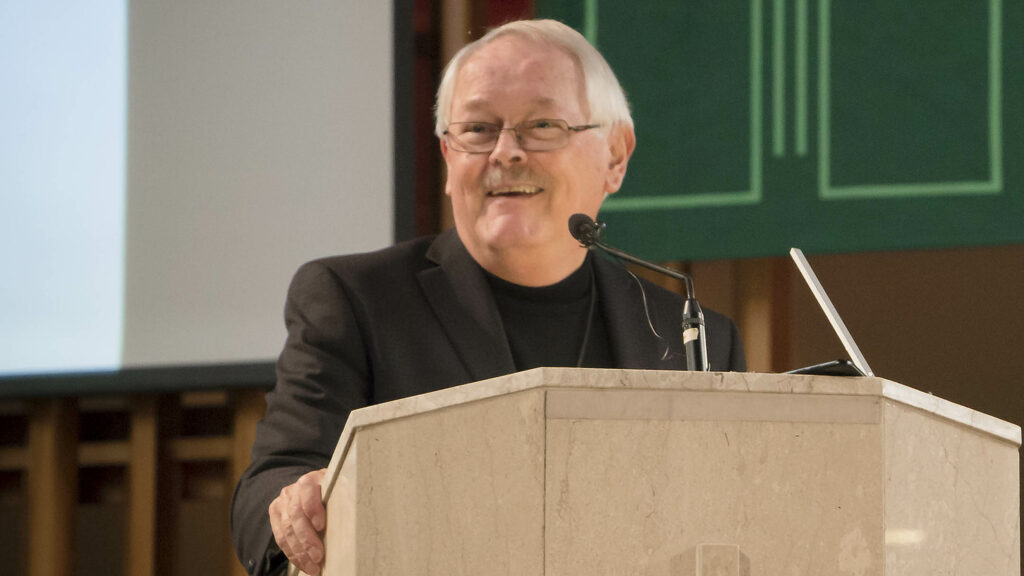I grew up in a close family and one of hardest things I ever did was to leave home and family at the age of seventeen to enter the novitiate of the Missionary Oblates of Mary Immaculate. That novitiate year wasn’t easy.
I missed my family intensely and stayed in touch with them insofar as the rules and communication of the day allowed. I wrote a letter home every week and my mother wrote back to me faithfully each week. I still have and cherish those letters. I had left home but stayed in touch, a faithful family member.
But my life became a lot more complex and socially demanding after that.
I moved to a seminary and began to live in a community with sixty others, with people entering and leaving constantly throughout my seven years there so that by the time I’d finished my seminary training I had lived in close community with over one hundred different men. That brought its own challenges. People you’d grown close to would leave the community to be replaced by others so that each year there was a new community and new friendships.
In the years following seminary, that pattern began to grow exponentially.
Graduate studies took me to other countries and brought a whole series of new persons into my life, many of whom became close friends. In more than forty years of teaching I have met with several thousand students and made many friends among them.
Writing and public lectures have brought thousands of people into my life. Though most of them passed through my life without meaningful connection, some became lifelong friends.
I share this not because I think it’s unique, but rather because it’s typical. Today that’s really everyone’s story. More and more friends pass through our lives so that at a point the question necessarily arises: how does one remain faithful to one’s family, to old friends, former neighbors, former classmates, former students, former colleagues, and to old acquaintances? What does fidelity to them ask for? Occasional visits? Occasional emails, texts, calls? Remembering birthdays and anniversaries? Class reunions? Attending weddings and funerals?
Obviously doing these would be good, though that would also constitute a full-time occupation. Something else must be being asked of us here, namely, a fidelity that’s not contingent on emails, texts, calls, and occasional visits.
But what can lie deeper than tangible human contact? What can be more real than that?
The answer is fidelity, fidelity as the gift of a shared moral soul, fidelity as the gift of trust, and fidelity as remaining true to who you were when you were in tangible human community and contact with those people who are no longer part of your daily life. That’s what it means to be faithful.
It is interesting how the Christian scriptures define community and fidelity.
In the Acts of the Apostles we read that before Pentecost those in the first Christian community were all “huddled in one room”. And here, though physically together, ironically they were not in real community with each other, not really a family, and not really faithful to each other. Then after receiving the Holy Spirit, they literally break out of that one room and scatter all over the earth so that many of them never see each other again and now, geographically at a distance from each other, ironically they become real family, become a genuine community, and live in fidelity to each other.
At the end of the day, fidelity is not about now often you physically connect with someone but about living within a shared spirit. Betrayal is not a question of separation by distance, of forgetting an anniversary or a birthday, or of not being able to stay in touch with someone you cherish. Betrayal is moving away from the truth and virtue you once shared with that person you cherish. Betrayal is a change of soul.
We are unfaithful to family and friends when we become a different person morally so as to no longer share a common spirit with them.
You can be living in the same house with someone, share daily bread and conversation with him or her, and not be a faithful family member or friend; just as you can be a faithful friend or family member and not see that friend or family member for forty years. Being faithful in remembering birthdays is wonderful, but fidelity is more about remembering who you were when that birth was so special to you. Fidelity is about maintaining moral affinity.
To the best of my abilities, I try to stay in contact with the family, old friends, former neighbors, former classmates, former students, former colleagues, and old acquaintances. Mostly it’s a bit beyond me. So I put my trust in moral fidelity.
I try as best I can to commit myself to keeping the same soul I had when I left home as a young boy and which characterized and defined me when I met all those wonderful people along the way.

